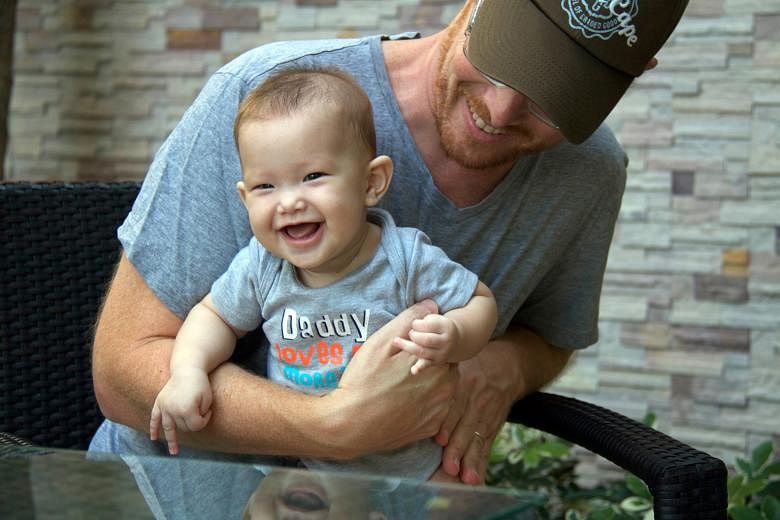A gay couple will head to the Thai courts today to appeal for parental rights over a baby born through a surrogate mother just before Bangkok clamped down on commercial surrogacy arrangements.
The case represents a high-profile test of a new law that bans foreigners from seeking surrogacy services in the kingdom in the wake of back-to-back scandals last year.
American national Gordon Lake and his Spanish husband Manuel Santos, both 41, had a baby through Thai surrogate mother Patidta Kusolsang in January this year. Although Ms Patidta handed the baby to the couple, she later refused to cede parental rights to them.
Over the subsequent months, a bitter struggle ensued as both sides took to traditional and social media to tell their sides of the story.
The fathers, fearful that the baby whom they named Carmen would be abducted by Ms Patidta, have moved from apartment to apartment to avoid being tailed.
They also have a son, Alvaro, who was born through surrogacy in India two years ago. He is now being cared for by a nanny in Spain, where the couple have a home.
Ms Patidta, 34, speaking to The Straits Times through her legal adviser Verutai Maneenuchanert, says she found out only after Carmen's birth that the couple are gay, and did not trust them to treat the baby well.
"She suspected that they are human traffickers," Ms Verutai said.
Mr Lake retorted in a Skype interview with The Straits Times that Ms Patidta was making "absurd accusations". Both the Thai police and child protection officials have visited the family, he said, and decided to leave Carmen in their custody pending the court hearing.
The two men are submitting their motion based on a provision under the new law that allows biological parents rights to seek parental rights.
"The court will consider the well-being of Carmen, so we are very optimistic," he said.
Lax rules made Thailand a popular destination for foreigners seeking rent-a-womb services until last year, when the government introduced a new law banning commercial surrogacy altogether. The law, which took effect in July, also set limits on "altruistic" surrogacy arrangements for married heterosexual couples.
Under the previous legal regime, the woman who gave birth to a child was considered its legal mother.
Hence, although Ms Patidta is not Carmen's biological mother - and Mr Lake is listed as Carmen's father on her birth certificate - Carmen cannot be taken out of the country unless Ms Patida gives up her parental rights over the child.
Mr Lake and Mr Santos have had to live apart from their son while they try to take Carmen home to Spain. Many Thais have been moved their plight and supported their battle to keep Carmen.
"People are making donations to help us pay for the legal bills… They have sent clothes and toys… and we have had so many offers of apartments," he said.
The infant, meanwhile, has become somewhat of a local celebrity, as the couple share snippets of her life to run the social media campaign to take the child home.
The custody battle comes one year after scandals forced the Thai military government to rein in the business. Some 1,000 surrogate babies used to be born in Thailand each year, according to the Medical Travel Quality Alliance, which promotes quality treatment for medical tourists.
But in July last year, news emerged that a surrogate baby named Gammy had allegedly been abandoned by his Australian parents in Thailand because he had Down syndrome, while his twin sister was taken back to Australia. The biological father was later found to be a convicted child sex offender.
Just weeks later, a Japanese man was reportedly found to have fathered at least 16 children through surrogacy arrangements.
The ensuing clampdown appears to have driven the trade across the border.
A report by the Bangkok Post last week highlighted that surrogacy arrangements are now growing in Cambodia, where the practice is largely unregulated.
"(Thai surrogate mothers) travel to Phnom Penh for embryo transfer, then back to Thailand for the gestational period," Mr Sam Everingham, the founder of Australian advocacy group Families Through Surrogacy, told the paper.
"It's assumed births will take place in Cambodia."

